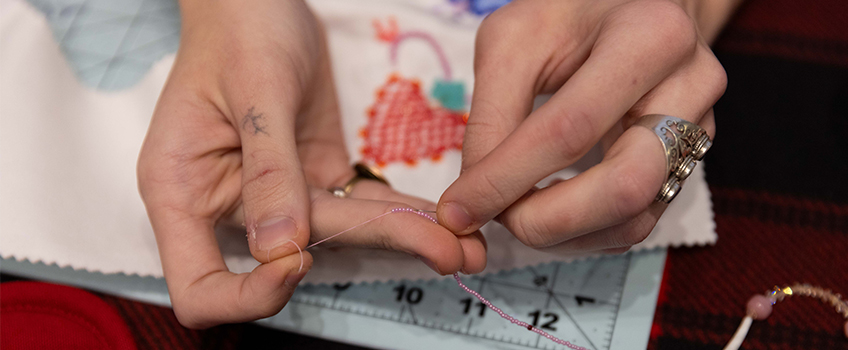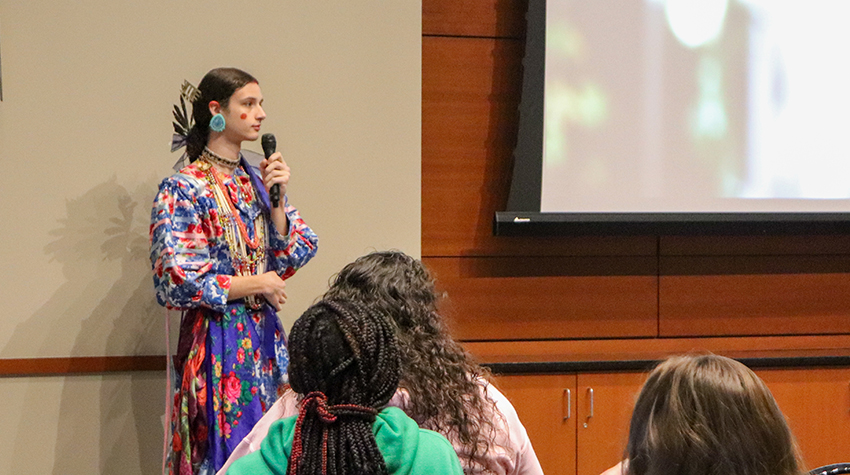New Program Centers Indigenous Cultures and Identities

Traditional beadwork is an intricate process that River Webb and Claudia Haddad have mastered. They displayed their various creations during the Feb. 22 event on campus.
Galloway, N.J. – Students, staff and faculty on the Galloway campus gathered in the Campus Center Board of Trustees Room on Feb. 22 to celebrate and learn more about Indigenous culture.
Guests River Webb and Claudia Haddad, members of the Nez Perce & Meskwaki (Webb) and Mi’kmaw (Haddad) Northeastern Woodland tribes, presented to the audience the ceremonial and educational role of being a 2 Spirit individual and displayed their traditional beadwork.
During their presentation, Webb – who was recently given the title “International 2 Spirit Ambassador” – explained that the 2 Spirit identity is a contemporary word that used to replace outdated and offensive terms. The identity, which has various roots in history due to the diverse array of different Indigenous/Native tribes, has existed forever.
“[2 Spirit] is a word meant to unify different nations - we all have our own words for 2 Spirit people in our languages, and their roles or descriptions might look different,” Webb shared. “People like us have existed and carried this role in our culture forever, as we are part of our culture. It's not a new identity, but this word, and the unity it provides for us between Tribal Nations, that is what is new, and what the word provides for us.”
For Webb, being 2 Spirit is how they identify themselves due to their gender identity, sexual orientation, spiritual role in ceremonies and cultural role as a knowledge keeper and educator.
They also spoke about the challenges of 2 Spirit people, including being discriminated against and/or murdered due to their identity, like what is being alleged in Oklahoma with Nex Benedict, a 2 Spirit high-schooler who was bullied and assaulted a day before their death.
Webb hopes that by educating non-Natives on these situations and supporting social justice advocates like Roxanne White, a Nez Perce woman who has single-handedly found more missing Indigenous women and girls than her local police station, 2 Spirit individuals will be able to live life to their fullest potential.
Haddad sang and talked about how she transitioned as a transgender woman in the 1970s – she’s proud of how the next generation of Indigenous Americans is more receptive to the fluidity of gender.




“[Back then], you would be taken to an institution and closed up. You lived under the radar and made sure to become a female, but today, we have 2 Spirit folks who can walk in both worlds,” Haddad shared during her presentation.
For Van Nhi Ho, coordinator of LGBTQ+ initiatives for the Women’s Gender & Sexuality Center, the program was an opportunity for students to explore another culture.
“It's very important for me to shed light on indigenous culture because we are on Lenni-Lenape land, and that's something that is rarely discussed. But Claudia and River immediately knew the land and even knew members of the same tribe. So, it was just kind of full circle,” Ho shared when talking about the purpose of bringing the guests to campus. “My aim here is to make sure that (Indigenous) students feel supported and heard and for this to be a way to bridge the gap for students who’ve ever been curious about a different culture that they might have been too afraid to ask about or unsure of where to go to for this information.”
One of those curious students, Psychology major Elisabeth Jacoby of Jackson, was happy to learn from Webb and Haddad and thought that the program, as well as the crafts that they created, was interesting.
“Usually, I have bad concentration, but I just could not stop listening,” Jacoby said. “I can’t wait to go up there and see what they have at their table – they talked about how they make their own clothes and stuff, and it’s so intricate. You have to have a passion to do that.”
Connie Tang, a faculty member in the School of Social & Behavioral Sciences, felt a connection with Webb and Haddad due to her cultural identity not being the “mainstream” and appreciated learning more about them.
“I feel like when you encounter something that's not within your culture, it's almost like feeding the soul. Uniqueness really makes us strong,” Tang said.
Computer Science major Alexis Gonzalez was in awe of the cross-cultural connection of Indigenous peoples: his grandmother was a Taina from Puerto Rico, and some of the cultural aspects that the guests shared felt familiar to lessons he learned from her. He praised Stockton University for inviting guests like Webb and Haddad, as he feels that presentations like this one are important for students to hear both inside and outside of the classroom.
“We need leaders like River here, who's willing to stand up and speak for the people who really don't have a voice in the current media climate,” Gonzalez said. “All anyone wants is just to be happy and to live their life in a way that makes them feel happy – to deny that is the cruelest form of torture, so I'm just happy that we have someone who would come to Stockton to speak and broaden people's horizons.”
River Florence Webb | #StocktonVoices

Van Nhi Ho, a graduate coordinator for the Women’s Gender & Sexuality Center, hosted a “2-Spirit Social” on Feb. 7.
The keynote speaker and presenter, River Florence Webb is a Nez Perce and Meskwaki Two-Spirit, recognized by members of their (Nez Perce) tribe as a traditional scientist and knowledge keeper due to their efforts in preserving Titooqatímt, the Nez Percelanguage.
In acknowledgment of the Lenni Lenape Tribe of Galloway, River wore their Meskwaki camp dress since the Meskwaki are an Algonquian people, like the Lenni Lenape. Below are some of the topics they discussed.
Explaining the term “2-Spirit”
It can be incredibly hard to explain because there are so many binaries that white society puts on a 2-Spirit, or even transgender, person to try to define their “trans-ness” or “Native-American-ness.” There are so many rules and scales and adjusters that people want to use to define it but it is really undefinable.
When I do try to teach people unfamiliar with my culture, I say that 2-Spiritness is a spiritual role, gender identity, cultural role, sexual orientation and so much more. Those four things are the big, key pieces of what a person’s 2-Spirit identity can be. You cannot quantify being 2-Spirit.
Maybe someday, this will be more of a spiritual role for me, and these things will change. But right now, it’s about my gender identity and how it intersects with my culture, and that’s what makes me 2-Spirit. There are many ways to be a 2-Spirit person.
– Story by Loukaia Taylor
– Photos by Susan Allen


